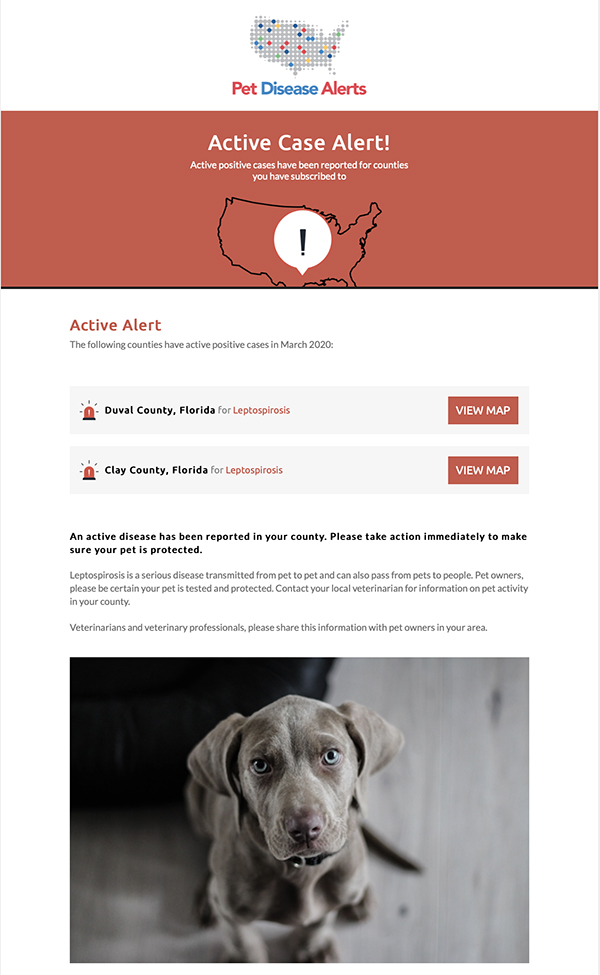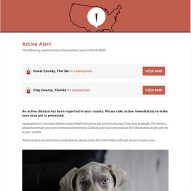Get pet disease alerts on infectious canine leptospirosis!
NEWS RELEASE
New “Pet Disease Alerts” Meets Critical Need to Alert Veterinarians, Pet Owners about Infectious Disease Outbreaks Threatening Health of Pets and People
Subscription service launches with text/email alerts about local cases of Leptospirosis — a highly infectious disease potentially fatal to dogs — that can be transmitted to people
Service to expand with alerts for canine influenza this fall
SALEM, ORE. (June 17, 2020) — Pet Disease Alerts, a nonprofit established by the Companion Animal Parasite Council (CAPC), announces the launch of its new service to alert veterinarians and pet owners about outbreaks of Leptospirosis. The highly infectious, bacterial disease can be fatal to unvaccinated dogs — and transmitted to people. The subscription service will add alerts for other bacterial and viral diseases, including canine influenza, this fall.

“Because highly infectious diseases like Leptospirosis can spread rapidly, it’s essential for veterinarians and dog owners to have timely, local information about diagnosed cases. Pet Disease Alerts is the first and only service to directly communicate current, positive leptospirosis cases in every county across the United States,” said Dr. Chris Carpenter, DVM and CEO of Pet Disease Alerts. “With the immediacy of a text or email alert, the new service enables veterinarians and pet owners to proactively protect pets — and their families.”
Unvaccinated dogs and people can contract leptospirosis when in direct contact with stagnant water and soil contaminated by the urine of infected animals such as racoons, rats or other wildlife. Common sources of infection include puddles, creeks, ponds, shallow lakes and rivers.
“If you receive an alert of one diagnosed case of leptospirosis in your county, that is enough for veterinarians and pet owners to be alarmed,” said Emilio DeBess, DVM, MPVM, State Public Health Veterinarian for the State of Oregon and Pet Disease Alerts board member. “Just one case is the tip of the iceberg of undetected and potential infections. The presence of one diagnosed case in a local community has the potential to threaten your dog’s life — and put your family’s health at risk.”
Once a dog has contracted leptospirosis, the incubation period is from one to four weeks. “In the meantime, the infected dog sheds the bacteria into their environment creating a source of infection to other dogs — and to their human family,” said Dr. Craig Prior, BVSC, CVJ and Pet Disease Alerts board member.
In people, leptospirosis can cause symptoms such as fever, headache, vomiting, jaundice, abdominal pain, diarrhea and rash. Without treatment, Leptospirosis can lead to damage of the liver, kidney or central nervous system.
“Leptospirosis is a disease that can keep veterinarians up at night,” said Emilio DeBess, DVM, MPVM, State Public Health Veterinarian for the State of Oregon and Pet Disease Alerts board member. “It can be challenging to diagnose in dogs because early symptoms are vague — lethargy, inappetence, vomiting, diarrhea — and can correlate with other diseases. By the time a diagnosis is confirmed, it’s often too late, leading to acute renal or liver failure — and people in the household have potentially been exposed.”
Misperceptions about leptospirosis
There are common misperceptions about leptospirosis that contribute to increased risk.
- Leptospirosis was previously considered a disease confined to rural areas. This is no longer the case. Leptospirosis is now diagnosed in dogs in suburban and urban neighborhoods, including apartment complexes, condominiums and gated communities — in all 50 states.
- Pet parents mistakenly underestimate the risk for leptospirosis because their dog doesn’t swim in ponds or wade in creeks. “Yet all unvaccinated dogs are at risk for leptospirosis when they simply step in a small puddle on a daily neighborhood walk or walk on damp soil in their backyard,” DeBess said.
- Because older dogs are less active, there is a misperception that they aren’t at risk. The majority of leptospirosis infections occurs in dogs from ages 5 to 9-years old.
- Dry climates are typically mistaken to not be at risk for leptospirosis. Any place that gets rain at any time of the year has the potential for leptospirosis outbreaks.
“And similar to how the coronavirus is transmitted, when people touch an infected dog — and then touch their face — they are at risk of contracting leptospirosis through their mouth, nose and eyes,” DeBess said.
Fortunately, annual leptospirosis vaccines are available to protects dogs — and their families. Time-sensitive notifications from Pet Disease Alerts provide veterinarians and pet parents with critical, local information to help make decisions about testing dogs with symptoms, vaccinating unprotected dogs or making sure dogs are current on annual vaccinations.
To receive leptospirosis alerts, complete a short registration form on the Pet Disease Alerts web site (www.PetDiseaseAlerts.org) and indicate three counties to monitor for a year with a $5 donation. If positive cases of Leptospirosis are diagnosed in your local area, the service will send an alert via email and/or text.
About Pet Disease Alerts
Pet Disease Alerts is a public charity focused on alerting pet owners to the threat of pet diseases in their local areas. Established by the Companion Animal Parasite Council (CAPC) in 2018, Pet Disease Alerts was founded to directly communicate crucial, time-sensitive information about disease threats, encouraging pet owners to be proactive by visiting their veterinarian and getting their pets tested and protected. For more, visit https://petdiseasealerts.org


My Dog Died in July 11, 2020 after spending 8K in ICU with every test, even some repeated. She had many symptoms, but no clear diagonsis. Prior to this, she was completely fine, doing after fighting Cancer 2 yrs ago, and having unbalanced hormone issues. We do not know if it was Covid 19, Lepto, Dog Flu, Parvo, Distemper, Etc. But she died weak from not eating, in an Oxygen Tent, not being able to breathe, with a temp, that 2 antibiotics could not fight. I have a new puppy, and want to be aware of any outbreaks to protect her = also our family from getting sick. I am now aware of the dangers at dog walks,+ parks, and that shots do not completely protect our dogs especially if they have a weak immune system or have been under stress.
Thank you for this info coming out!
Sue
Oh, I’m so, so sorry to hear that.
CommentThis alert service is such an important step forward in protecting both pets and their families from serious infectious diseases like leptospirosis. Timely, location-specific updates can truly make a difference in prevention and awareness. It’s reassuring to know there’s a proactive resource out there keeping pet owners informed and prepared. *